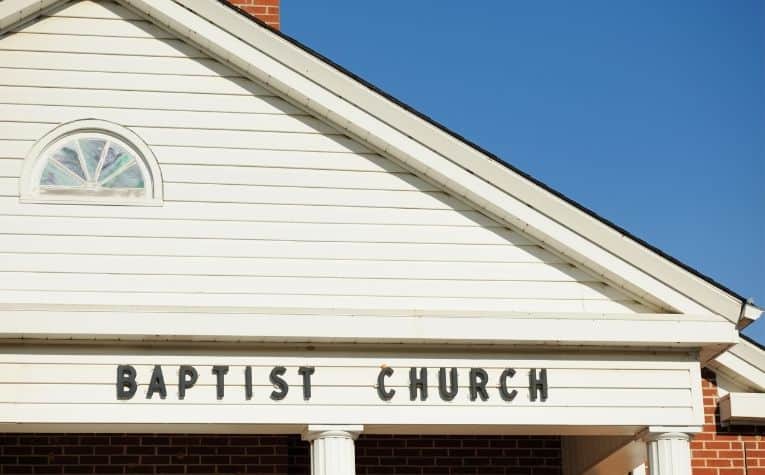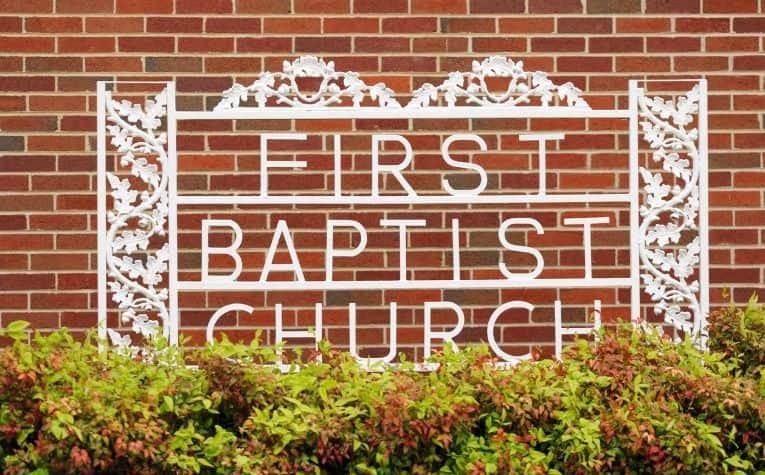Baptism is an important event in Christianity. Christians take baptism seriously because the New Testament — and even Jesus Christ himself — instructs people to be baptized and to baptize others. Yet Christians have different views on baptism, including Baptists.
Baptists conduct “believer’s baptism,” as opposed to “infant baptism,” because they believe that only people who confess their sins and profess faith in Christ should be baptized. This rules out baptizing infants because of their inability to hold and express these convictions.
According to historic Baptist theology, water baptism, as opposed to Spirit baptism, is one of the two ordinances Christ gave the Church. (The other is the Lord’s Supper.)
Below, readers will find easy-to-understand explanations for why Baptists believe the way they do, as well as comparison charts to help people see the differences between Baptists and other denominations, like Methodists, Presbyterians, and Lutherans, who perform infant baptisms.

Believers Baptism vs. Infant Baptism: Comparison Chart
Not surprisingly, Baptists have different terms, different purposes, and different Scripture references for baptism as they see it. The chart below will help the reader gain a general understanding of the differences between the positions.
| Baptist Beliefs | Infant Baptism | |
| Terms | “believer’s baptism” “credo baptism” (credo means “believe”) | “infant baptism” “paedo baptism” (paedo means “child”) |
| Adherents | Baptist churches; certain other Protestant groups (e.g., Assemblies of God) | Roman Catholicism; Eastern Orthodox; Protestants: Presbyterian, Methodist, Lutherans |
| Command to baptize infants? | There is no biblical command to baptize infants. (See biblical support below.) | There is no biblical command not to baptize infants. (See biblical support below.) |
| What’s required for baptism? | A clear profession of faith in Christ; some Baptists refer to the “Age of Accountability,” but some don’t.* | Christian parents who believe their children are included in God’s covenant. |
| Covenant inference | There is a significant discontinuity between the Abrahamic Covenant and Christians in the Church Age. | There is strong continuity between Abrahamic Covenant and Christians in the Church Age. |
| Biblical support #1 | Christ told his followers to baptize disciples (Matt. 28:19) | Parents brought babies to Christ (Lk. 18:15), and he blessed them (Mk. 10:13-16) |
| Biblical support #2 | Believers are pictured getting baptized in the New Testament (Acts 8:5-12, 26-40) | Households are said to have been baptized (Acts 16:15, 33-34; 1 Cor. 1:16) |
| Biblical support #3 | In some passages, conscious faith is connected to baptism (Gal. 3:26-27) | Peter said the Holy Spirit was for believers and their children (Acts 2:39) |
* Key term | The Age of Accountability: According to those that hold this viewpoint, this is the age at which children or young adults become morally responsible (e.g., Deut. 1:39). The exact age varies.
Moral responsibility implies the ability to respond to the gospel. Prior to this age, it was believed that children don’t have the mental faculties to be held morally accountable, and God extends special grace to them.
It is important to note that different traditions will emphasize different aspects of the doctrine and use different bible verses to support their view.
For example, hypothetically, a Southern Baptist theologian may explain the doctrine differently than a North American Baptist theologian. Likewise, a Methodist theologian and Reformed theologian may understand infant baptism differently. (Also, see First Baptist vs. Second Baptist: What’s the Difference?)

What Does “Believers Baptism” Mean?
“Believers baptism” means that only people who consciously and willingly profess faith in Christ for salvation should be baptized. There is no exact age set.
For instance, if an eight-year-old professes faith in Christ, then he or she is a candidate for baptism. The same is true for an 18-year-old or a 98-year-old. The point is that the person is a “believer.”
How is a person assessed for baptism? A candidate for baptism often talks with a minister, pastor, or another church leader, who seeks to discern if the person has genuinely responded to the gospel and understands the meaning of baptism. Questions may include:
- “Tell me about when you decided to put your faith in Christ for salvation. Why did you make that decision?”
- “What makes you interested in being baptized? Share with me why it is important to you?”
In the Baptist tradition, assessing a person for baptism is not a pop quiz on the bible or even a doctrinal litmus test. What’s important is not that the person is a theologian, but they are a professing follower of Christ. (Also see What Do Baptists Believe About Salvation?)
Key term | professing: The basic definition of the word “professing” is to affirm one’s faith in or allegiance to a certain set of beliefs. In Baptist theology, only a person that professes faith in Christ for salvation is a candidate for baptism.
What Is the Biblical Basis for Believer’s Baptism?
Many Baptists would concede that there is no verse of Scripture that mandates believers’ baptism in a straightforward manner, just as there is no verse that commands Christians to baptize infants.
Instead, both groups cite examples mostly from New Testament narratives that they believe illustrate their position. Yet they also deduce certain conclusions from verses that don’t directly address the topic. (Also see What Bible Translation Do Baptists Read?)
For example, Baptists often cite specific verses in the book of Acts as illustrations of their convictions and teachings:
- Example 1 | Acts 2:41 “Those who accepted his message were baptized, and about three thousand were added to their number that day.” (NIV)
- Baptist understanding: Baptists emphasize that it’s those who accepted Peter’s message that were baptized. This was a result of their belief. Infants could not have accepted Peter’s message, therefore those that were baptized were adults.
- Example 2 | Acts 8:12 “But when they believed Philip as he proclaimed the good news of the kingdom of God and the name of Jesus Christ, they were baptized, both men and women.” (NIV) Also, see Do Baptists Believe Jesus is God?
- Baptist understanding: Adults — “men and women” — who believed the message Phillip preached were those that were baptized. Infants aren’t capable of belief and clearly aren’t included in the phrase “men and women.”
- Example 3 | Galatians 3:26-27 “So in Christ Jesus you are all children of God through faith, for all of you who were baptized into Christ have clothed yourselves with Christ.” (NIV)
- Baptist understanding: Baptists infer from verses like this that in order for the statement to be true, the author, Paul, in this example, must have people older than infants in mind. The people he is addressing have put their faith in Christ and personally trust in him for their salvation. (Also see Do Baptists Believe in the Holy Spirit?)

What Do Baptists Believe About Households Getting Baptized?
Elsewhere in Acts, there are verses that describe groups of people getting baptized, from which advocates of infant baptism deduce that infants were likely among the baptized.
- Acts 16:15a ” When [Lydia] and the members of her household were baptized, she invited us to her home.” (NIV)
- Explanation: Advocates of infant baptism believe that the word “household” implies that children, perhaps even babies and infants, were baptized. Baptists often respond to this interpretation by saying that the verse doesn’t explicitly say babies and infants were baptized, and so doctrine and practice shouldn’t be based on an inference.
- Acts 16:33 “At that hour of the night the jailer took them and washed their wounds; then immediately he and all his household were baptized.” (NIV)
- Explanation: Advocates of infant baptism teach that the description of the jailor’s household implies that perhaps babies and infants were among the baptized. Similar to Acts 16:15a, Baptists often respond that that’s an inference not explicitly taught in the verse.
- 1 Cor. 1:16 “Yes, I also baptized the household of Stephanas; beyond that, I don’t remember if I baptized anyone else.” (NIV)
- Explanation: Citing the word “household,” some advocates of infant baptism use this verse to support their view. In response, many Baptists point out that later in the epistle, Paul mentions that he and Silas preached to the jailor “and to all the others in his house” (16:32). Baptists understand this to mean that those who were baptized were those that responded to Paul’s preaching.
What about household conversions apart from baptism? Baptists sometimes point out, as a secondary argument, that there are other verses in the New Testament that don’t mention baptism, but they do teach that one person’s conversion led to the conversions of others in their household:
- John 4:53 “Then the father realized that this was the exact time at which Jesus had said to him, ‘Your son will live.’ So he and his whole household believed.” (NIV)
- Acts 18:8 “Crispus, the synagogue leader, and his entire household believed in the Lord; and many of the Corinthians who heard Paul believed and were baptized.” (NIV)
Protestant Traditions That Baptize Infants
Several Protestant traditions have a long history of baptizing infants, though their reasons for doing so aren’t the same as the Roman Catholic Churches’ reasons. Protestant denominations that have historically practiced baptizing infants include:
- Lutherans
- Anglicans/Episcopalians
- Methodist
- Presbyterian/Reformed
These Protestant traditions disagree in other areas like salvation; for instance, Methodists are Arminian, Presbyterian/Reformed are Calvinist, and they agree on the general parameters of baptizing infants. (Also see Do Baptists Believe in Predestination?)
What is their rationale for baptizing infants? It’s the conviction of these traditions that all children of believing parents be baptized.
This understanding of baptism is based not on an individual’s profession of faith in Christ but on their membership into the covenant community.
Key term | covenant community: The “covenant community” is the people of God bound together through faith in Christ and the work of the Holy Spirit in and through the Church.
What Is the Biblical Basis for Baptizing Infants?
Circumcision, as it occurred in the Old Testament, is central to the conviction to baptize infants. All male infants in Israel were circumcised when they were eight days old.
Of course, they weren’t circumcised based on their personal profession of faith; they were baptized as a sign of their inclusion into the Israelite community. (Also see This Is Why Baptists Don’t Baptize Infants?)
According to this view, baptism is the New Testament equivalent to Old Testament circumcision. They cite Colossians 2:11-12, which parallels circumcision and baptism, for Scriptural support.
“In him you were also circumcised with a circumcision not performed by human hands. Your whole self ruled by the flesh was put off when you were circumcised by Christ, having been buried with him in baptism, in which you were also raised with him through your faith in the working of God, who raised him from the dead” (emphasis added).
Baptist Responses To Paedobaptist Arguments
Baptist responses to arguments that advocates of infant baptism employ can vary, but often these points are often made:
- Circumcision and baptism aren’t exact parallels. Circumcision was applied to any Israelite male and even some non-Israelite ones (e.g., Gen. 17:23), while baptism, even among paedobaptists, is selectively applied. Birth was the only thing required for circumcision. Belief is the requirement for baptism.
- In the New Testament, the “covenant community” is the Church, which by definition, is composed of genuine believers. There is no ceremony, ordinance, or sacrament that can make a person part of the community. Only an individual’s person profession of faith can incorporate them into the true Church.
- The New Testament doesn’t teach people to baptize infants and doesn’t illustrate their baptism either. The so-called “household” baptisms were the result of multiple people being baptized who were part of the same family.
- If a person who is baptized as an infant, and is, therefore, part of the covenant community, never comes to professing personal faith in Christ, then the covenant community is composed, in part, of nominal “believers.”
Key term | nominal “believers”: The word “nominal,” as it is being used in this context, refers to people who believe “in name only.” In other words, they may accept the label “Christian,” but it’s only a name and they don’t actually have faith in Christ.
Roman Catholicism and Infant Baptism
The Roman Catholic Church practices infant baptism, but not for the same reasons as the Protestant churches that baptize infants do.
Historically, the Catholic church has taught that baptism is required for salvation. Practically, baptizing infants leads to their salvation later in life. Baptists strongly disagree that baptism is necessary for salvation.
Because of this belief, baptism in the Catholic church is considered a “means of grace,” which means its a channel through which God’s grace flows to the individual, even apart from an individual’s personal professing of faith. (Also, see Baptist vs. Catholics: What’s the Difference?)

What Is Catholicism’s Biblical Basis for Infant Baptism?
Catholic teaching on infant baptism is often built on bible verses that link salvation and baptism together, though Baptists would dispute their interpretations. These verses include (emphases added):
- John 3:5, “Jesus answered, “Very truly I tell you, no one can enter the kingdom of God unless they are born of water and the Spirit.” (NIV)
- Baptist response: Baptist interpretations of the relevant phrase varies. Some understand it as physical birth. Others associate it was the cleansing from sin that comes with salvation (e.g. Ezek. 36:25-27).
- Titus 3:5b, “He saved us through the washing of rebirth and renewal by the Holy Spirit.” (NIV)
- Baptist response: Most Baptists understand “washing” as metaphorically describing being born again to new life in Christ.
- Ephesians 5:25-26, “Husbands, love your wives, just as Christ loved the church and gave himself up for her 26 to make her holy, cleansing her by the washing with water through the word.” (NIV)
- Baptist response: Most Baptists point out that, like Titus 3:5, the “washing” imagery isn’t to be understood literally. In this case, it refers to the work that God’s word accomplishes in the heart of a believing spouse.
- 1 Peter 3:21a, “…and this water symbolizes baptism that now saves you also—not the removal of dirt from the body but the pledge of a clear conscience toward God.” (NIV)
- Baptist response: That second part of the sentence explains the first part of it, according to Baptist theology. The literal act of being baptized with water doesn’t save a person, but the inward spiritual reality of new life in Christ that baptism symbolizes does.
How Baptists Baptize People
Because Baptist churches are largely independent bodies, how baptisms are performed can vary. Nevertheless, the steps below are commonplace in most Baptist churches:
- A meeting with leadership: When a church announces a date for baptisms, which can happen from once a year to several times a year, it is often accompanied by an invitation to speak with the pastor or another church leader, like an elder. At this meeting, the leader has a conversation with the candidate and perhaps a parent if the candidate is a minor, asking them questions about their faith in Christ and why they want to be baptized.
- The location of baptism: Many Baptist churches have a baptismal in their sanctuary, which is deep enough to fully immerse an adult (more below). Baptismals may be in the very front of the sanctuary back behind the pulpit, off to the side yet visible to the congregation; some churches have built theirs below the floor, in which case the floor “lid” is removed when baptisms occur. In the summer, it’s not uncommon for Baptist churches to picnic at a park and perform baptisms in a creek or river.
- Interview in the baptismal: The person performing the baptisms is often the pastor, but other pastors on staff, like Youth Pastors, may do so as well. From within the baptismal, the pastor asks the person being baptized questions, which often include when they became a Christian and why they want to be baptized. Testimony is an important part of believers’ baptism. (Also see Can a Baptist Be a Godparent?)
- Immersion: The person performing the baptism will often say something like “Based on your profession of faith in the Lord Jesus Christ, I baptize you in the name of the Father, the Son, and the Holy Spirit” and slowly recline them back into the water. When they are fully immersed, the person performing the baptism raises them back up to a standing position.
Why Do Baptists Do Full-Immersion Baptisms?
There are multiple reasons why Baptists are convicted to perform full-immersion baptism.
- The Greek word for “baptism” means immersion: Baptizo refers to something being submerged under water. Advocates of infant baptism argue that the meaning of baptizo has a range of meaning that is broader than full immersion.
- Only full immersion reflects Romans 6:3-4: Going underneath the water signifies death, and being raised out of the water signifies life. Advocates of infant baptism argue that Paul is just using symbolic language and that his description isn’t to be taken so literally.
“Or don’t you know that all of us who were baptized into Christ Jesus were baptized into his death? We were therefore buried with him through baptism into death in order that, just as Christ was raised from the dead through the glory of the Father, we too may live a new life.”
Baptists argue that the early church performed full-immersion baptisms. Below are three verses commonly cited (emphases added):
- Mark 1:5, “The whole Judean countryside and all the people of Jerusalem went out to him. Confessing their sins, they were baptized by him in the Jordan River.” (NIV)
- John 3:23, “Now John also was baptizing at Aenon near Salim, because there was plenty of water, and people were coming and being baptized.” (NIV)
- Acts 8:38, “And he gave orders to stop the chariot. Then both Philip and the eunuch went down into the water and Philip baptized him.” (NIV)
What Is the Point of Baptism for Baptists?
Unlike infant baptism, which connects a child to the covenant community, Baptists have a different understanding of the purpose of baptism:
- Obedience: Jesus told people to be baptized, so when a person follows his instructions, it results in things like blessing, joy, and maturity.
- Christ-likeness: Obedience to Christ strengthens a person’s relationship with him. Additionally, since Christ himself was baptized, a disciple who follows in his steps learns more about being like him.
- Testimony: Public sharing of one’s faith is an important part of being baptized. It’s, in part, a declaration that their faith in Christ has transformed them, and they have gone from death to life (Rom. 6:3-4), and they want people in their life to know that.
- Church: In many Baptist churches, baptism results in their membership in the church. Baptism signifies their belief in Christ, which makes them part of the true Church and so their membership in the local church is also recognized.
Ordinance vs. Sacrament: Comparison Chart
Baptists mostly prefer the term “ordinance” over “sacrament,” in part because of the Roman Catholic Church’s use of the later word.
Some non-Baptist Protestants, like Lutherans and Anglicans, use both terms, even though they disagree theologically with the Catholic teaching that baptism is a means of grace independent of a person’s faith. (Also, see Baptist vs. Lutheran: What’s the Difference?)
| “Ordinance” | “Sacrament” |
| the term preferred by most Baptists | the term preferred by some Protestant denominations; used by Roman Catholics |
| related to the word “ordained” | from Latin via Greek, meaning “mystery” |
| Baptists believe there are two ordinances: baptism (e.g., Matt. 28:29) and the Lord’s Supper (e.g., Matt. 26:26-29). | Catholicism has six other sacraments: the Lord’s Supper (or Eucharist), confirmation, penance, reconciliation, extreme unction, holy orders, and holy matrimony. |
Is Baptism a Core Doctrine In Baptist Theology?
While baptism is very important to Baptists — after all, their tradition is named after the act — it isn’t a central theological doctrine. This means that people who hold contrary beliefs about baptism are still considered Christians, according to historic Baptist teachings.
What are examples of core doctrines in Baptist theology?
- The Trinity; that God is three persons in one and that each person, Father, Son, and Holy Spirit, are each fully God
- The inspiration and authority of Scripture
- The death of Christ is an atonement for sin, meaning that his death makes reconciliation between God and people possible
References:
[1] Source
[2] Source
[3] Source
Related Questions
The Baptist tradition is one of the largest branches of Christianity in America and around the world. Historically, some Protestant denominations have prohibited their members from activities like...
Baptist denominations and churches, which date to the 17th century, comprise one of the largest branches of Christianity in the Western world. While Christian churches in Baptist networks and...
